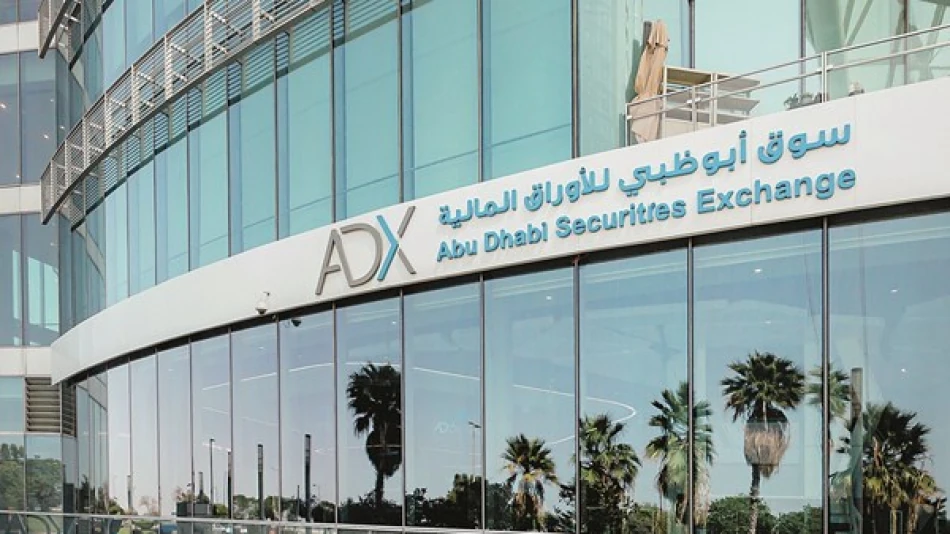
UAE Stock Market Sees 7.35 Billion Dirhams in Domestic Equity Trades Over 4 Days
Foreign Investors Fuel UAE Stock Markets Despite Overall Decline
UAE stock markets attracted AED 7.35 billion in liquidity over four trading days this week, driven primarily by strong foreign buying in Abu Dhabi despite institutional selling pressure across both major exchanges. The contrasting investor behavior highlights a strategic shift as international funds target UAE equities while local institutions take profits, signaling potential confidence in the market's long-term prospects even amid short-term volatility.
Tale of Two Markets: Abu Dhabi Attracts, Dubai Sees Outflows
The week's trading revealed a stark divergence between the UAE's two primary stock exchanges. Foreign investors poured a net AED 829.44 million into the Abu Dhabi Securities Exchange (ADX), while simultaneously pulling AED 139.12 million from the Dubai Financial Market (DFM). This selective approach suggests international investors are favoring Abu Dhabi's larger, more diversified listings over Dubai's market.
The combined markets processed over 1.86 billion shares across 128,885 transactions, demonstrating robust trading activity despite the mixed sentiment. UAE nationals maintained their dominant position, purchasing AED 3.93 billion worth of local stocks—AED 2.57 billion in Abu Dhabi and AED 1.36 billion in Dubai.
Abu Dhabi: International Confidence Meets Local Profit-Taking
Foreign Investment Surge
Non-Arab foreign investors led the charge in Abu Dhabi, generating net purchases of AED 787.68 million. These investors captured 31.9% of total trading value and 26.6% of share volume, purchasing AED 1.981 billion worth of stocks while selling only AED 1.194 billion. Arab investors and Gulf nationals also contributed with net purchases of AED 24.58 million and AED 17.17 million respectively.
This foreign buying spree mirrors similar patterns seen in other Gulf markets, particularly Saudi Arabia, where international investors have been increasing their exposure to regional equities amid diversification away from traditional Western markets and emerging market volatility.
Institutional vs. Retail Dynamics
While foreign money flowed in, local institutional investors took the opposite approach, registering net sales of AED 203.96 million. They purchased AED 3.893 billion but sold AED 4.043 billion, suggesting profit-taking or portfolio rebalancing. Individual investors stepped in as net buyers with AED 203.96 million, purchasing AED 1.143 billion against sales of AED 939.89 million.
Despite the positive investor flows, the ADX General Index declined 67.33 points to close at 10,033.75 points, down from 10,101.08 points the previous week. The market's total capitalization dropped by AED 10.65 billion to AED 3.096 trillion, reflecting broader market pressures despite the buying interest.
Dubai Market: Cautious Sentiment Prevails
Dubai's market told a different story, with foreign investors net selling AED 139.12 million after purchasing AED 1.012 billion but selling AED 1.151 billion. UAE nationals compensated by net buying AED 139.12 million, purchasing AED 1.363 billion against sales of AED 1.224 billion.
Institutional investors in Dubai followed their Abu Dhabi counterparts, net selling AED 172.59 million with purchases of AED 1.103 billion against sales of AED 1.275 billion. Individual investors provided support with net purchases of AED 176.54 million.
The DFM General Index closed at 5,989.21 points, declining 1.23% or 74.4 points. The market's total capitalization fell by AED 11.14 billion to approximately AED 1.028 trillion, with total trading value reaching AED 2.376 billion across 713.94 million shares in 50,989 transactions.
Market Implications and Investment Perspective
Strategic Positioning
The foreign investment concentration in Abu Dhabi likely reflects the exchange's heavier weighting toward energy, banking, and telecommunications giants that offer both dividend yields and exposure to regional economic growth. Companies like ADNOC Distribution, First Abu Dhabi Bank, and Etisalat Group provide international investors with liquid access to Gulf economic themes.
The institutional selling across both markets, totaling over AED 376 million, could indicate either profit-taking after recent gains or rotation toward other asset classes. This behavior often precedes market consolidation phases, potentially creating opportunities for patient investors.
Regional Context
The UAE's market dynamics align with broader Gulf trends where foreign institutional interest has grown amid geopolitical uncertainties and inflation concerns in developed markets. Unlike the more volatile crypto and technology sectors that have dominated global headlines, Gulf equity markets offer exposure to energy transition themes, infrastructure development, and regional economic diversification.
The mixed performance—strong liquidity but declining indices—suggests the market is in a price discovery phase, with international capital providing a floor while local investors remain selective. This pattern typically precedes either a sustained rally if economic fundamentals improve or further consolidation if global headwinds intensify.
Most Viewed News

 Layla Al Mansoori
Layla Al Mansoori






